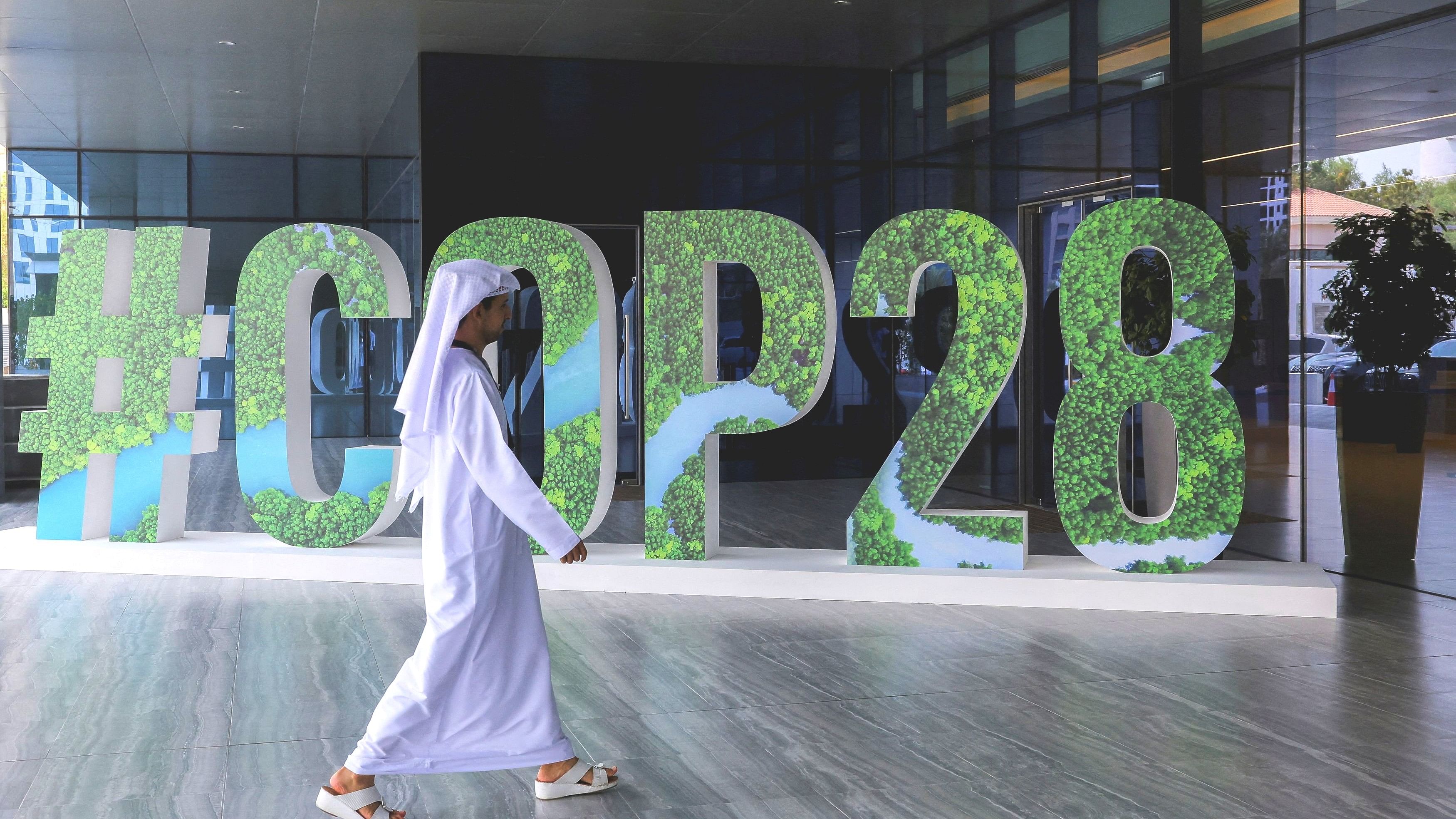
FILE PHOTO: A person walks past a "#COP28" sign during The Changemaker Majlis in Abu Dhabi, United Arab Emirates.
Credit: Reuters Photo
At an internal meeting in Dubai shortly after the United Arab Emirates (UAE) was chosen on November 11, 2021, as the host country for the 28th United Nations Climate Change Conference, a local minister asked participants what the UAE could gain from hosting the conference.
The mood in the room was exuberant because of the prestige associated with the annual Conference of the Parties of the UN Framework Convention on Climate Change (UNFCCC), better known worldwide this year as COP28. One of the participants at this meeting decided to be cheeky, unusual for a setting of that kind. When his turn came to answer the minister’s question, this individual said there is nothing to be gained from hosting a climate summit. Everyone in the room was flabbergasted. The minister who put the question asked the maverick to explain.
He asked the minister a counter-question. “Do you remember which country hosted the 18th COP? Do you know the city which hosted that conference?” The minister said she did not know. The non-conformist then took the floor. He told attendees at this meeting that COP18 was held in Doha in 2012. It was only the second time that a COP was being held in the Arab world. The first was in Morocco, COP7 in 2001. Qatar was also the second fellow member of the Organisation of Petroleum Exporting Countries (OPEC) to host a COP. Indonesia, a big producer of fossil fuels, was the first in 2007, the COP13 in Bali.
He pointed out that even those who ought to know in an Arab and OPEC country could not recall the COP18 held in a neighbouring Gulf state. Why, then, did Qatar go through all the trouble of competing to be the host of COP18 and put in at least two years of hard work to make an impact? “That is why I said there is nothing to be gained from hosting a climate summit. Only trouble,” the deviant rested his case.
Looking back, with preparations in the final stages now for the fortnight-long COP28 to open on November 30 in Dubai’s brand-new Expo City, this free-thinking meeting nearly two years ago, turned out to be a milestone. The UAE’s monarchical leadership decided then and there that they will spare no effort to make sure that the conference in Dubai will be on par with three or four of the previous 27 such UN meetings that anyone remembers or cite as reference points on global warming.
In some ways, the UAE is attempting to make COP28 memorable without precedent. The previous COPs which climate activists around the world usefully recall are: the first COP in Berlin in 1995, which set the ball rolling in this field, the third meeting in the series in Kyoto, Japan, which adopted what is known as the Kyoto Protocol and the historic Paris COP21 eight years ago, which adopted the first legally binding international treaty on Climate Change, commonly known as the Paris Agreement.
Recalling the words of the maverick at the internal meeting in Dubai, it is instructive to remember that India too hosted a COP in 2002. It reiterated India’s long-held stand that it was a victim of the policies of rich countries since the Industrial Revolution, which had led to global warming. The Delhi Ministerial Declaration urged the Group of Seven (G7) industrialised countries to transfer technology to nations like India to minimise the fallout of Climate Change. That is exactly where the demands made at COP8 stand two decades later.
The UAE has a record of thinking big and doing big things that are too long to list. The lay of the land in Expo City suggests that COP28 will be no exception even if some of the participating governments backslide on their environmental commitments. The ‘Green Zone’ at the summit venue is an example. In the past, the relationship between host governments and civil society at climate conferences has been mostly hostile, sometimes causing violence. Dubai is attempting to incorporate civil society into the COP28 space. The ‘Green Zone’ will be home to industry leaders, academics, and non-accredited delegates, and will hopefully be the voice for the otherwise voiceless on the perilous challenges to our planet. With thematic hubs to accelerate climate solutions, scope for progressive thinking, and 300 events on sustainability, and much more, it will be like a parallel summit and will pressure recalcitrant governments to listen to the voices of those who claim to represent the people at COP28.
KP Nayar has extensively covered West Asia and reported from Washington as a foreign correspondent for 15 years.
Disclaimer: The views expressed above are the author's own. They do not necessarily reflect the views of DH.